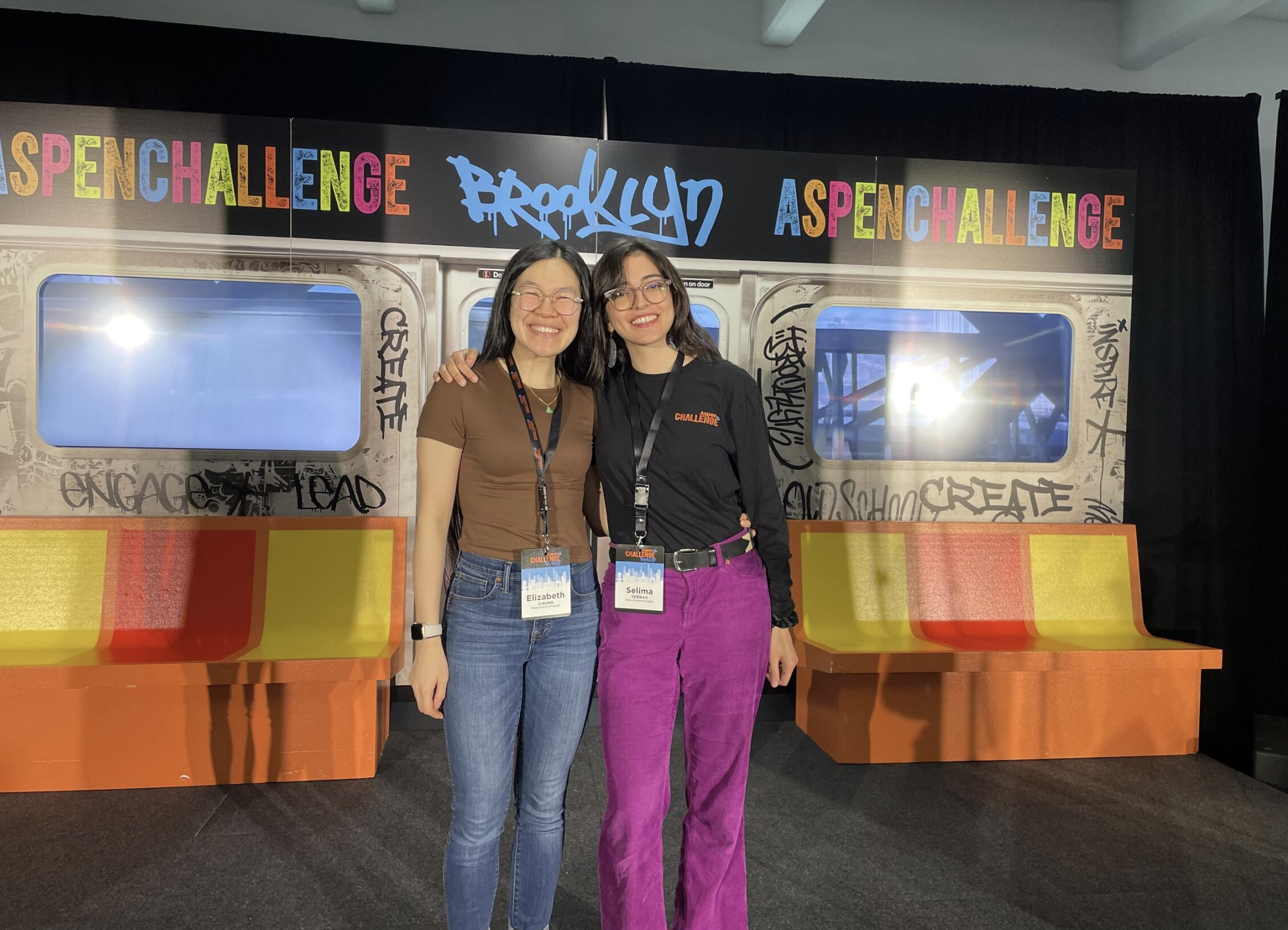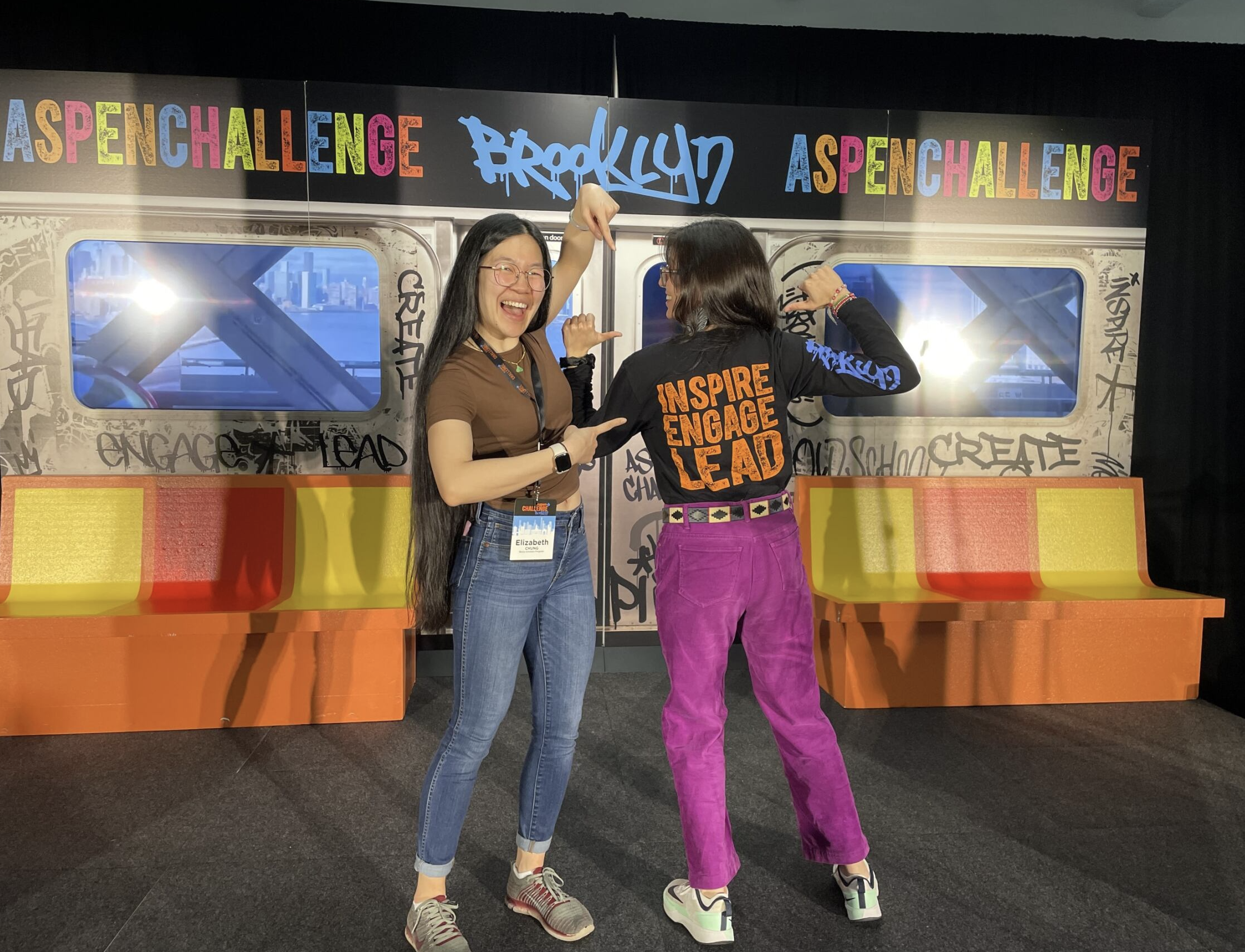Reflections From Aspen Challenge Brooklyn
Youth leaders in Brooklyn stepped into action—reflecting on what it means to believe “yes” and build community-change.

Aspen Challenge, launched by the Aspen Institute and the Bezos Family Foundation, empowers students to use their imagination, enthusiasm, competitive spirit, and sense of global citizenship to solve some of society’s toughest problems. Aspen Challenge was created to scale the Bezos Scholars Program and increase the impact started by youth leaders. Each year, they partner with two school districts, inviting twenty schools for each district to participate.
Ten teams of eight students and two adult educators gathered at the Challenge Forum and heard from community leaders working on challenges identified by participating students and educators as the most urgent to solve in their community. Topics addressed mental health and fostering a culture of kindness, creating a welcoming environment for newly arrived immigrants, and the alleviation of rat infestations, a unique challenge New York City is facing.
Over eight weeks, teams design fresh solutions to their selected challenge and put their work into action by engaging their community.
This year, four Bezos Scholars alum signed up to support the incredible Aspen Challenge team in hosting events in Brooklyn, New York and San Diego, California. Selima Terras (2022 alum) and Elizabeth Chung (2013 alum) share reflections on their experience in Brooklyn.

Finding Courage in Brooklyn
by Selima Terras
The venue space at the Brooklyn Army Terminal was unrecognizable. The once resonant industrial space was now bustling with energy, excitement, and anticipation. Rows of students and educators in matching outfits trickled in, bringing posters, balloons, and prototypes to impress the crowd. As groups settled at their designated tables and the DJ’s music faded, the keen-eyed judges entered and faced a vibrant subway-themed stage. It was time to see what the Aspen Challenge was about!
Two months to develop and carry out a project with a team isn’t a lot of time. But when standing on that stage, the process and five-minute presentation probably felt like a lifetime. Each of the 20 high schools had not only developed a mission and vision but also conducted research, organized community events, or designed products aimed at solving pressing challenges in their communities. The results were impressive. From rat mitigation strategies to initiatives promoting mental health awareness to campaigns providing support for undocumented youth, the diversity of topics covered was a testament to the breadth of challenges faced by Brooklyn communities and the ingenuity of its people.
The presentations were not just about showcasing solutions; they were about sharing stories of resilience, creativity, and collaboration. They included videos, skits, pictures, statistics, and action plans beyond the Aspen Challenge program’s formal end. Each student-led team poured their hearts and souls into their projects, demonstrating a deep understanding of the issues they aimed to address and a genuine passion for making a difference.
As I watched in awe, I was reminded of my experience as a Bezos Scholar only a few years ago. I remembered the knots in my stomach before presenting our project for the first time and the long hours of brainstorming, planning, doubting, and eventually moving forward. It takes courage to walk up on a stage, make things happen and invest time and energy in one’s community. Many students shared that since the start of the Aspen Challenge, they have been coming to school at least an hour early to gather with their peers and work on their projects. Many shared the challenges they encountered, including interpersonal relationships, logistical hurdles, and extenuating circumstances. As they came to the stage and shared their solutions, the audience learned that amidst navigating busy schedules, they found the time to conduct workshops in elementary schools, develop podcasts, organize day-long events, and even recycle hundreds of plastic bottles into hydroponic systems.
More than pitching an idea on an extravagant stage, the Aspen Challenge is all about the moments before and after the presentation, when young, committed minds gather and decide that they are the authors of their stories and agents of change. The moments when ideas are stretched, first steps are taken, and bridges are built. To train these “muscles,” people need spaces to practice. Spaces created and structured for young people to collaborate, are encouraged to think critically and creatively and to foster entrepreneurial thinking for social impact.
The structure is more than a deadline; it is about providing moral, intellectual, and material support systems that begin with making students and educators feel valued and continue fostering an environment of collaboration and empowerment. Aspen Challenge accomplishes this by placing students and educators at the forefront of the program’s design and vision. They are not just participants but co-creators of change who planted seeds and established connections.
Witnessing the incredible Aspen Challenge team in action, spreading their magic from one city to the next, was a great learning experience. They are a collaborative group of kind, sharp, organized, and hardworking people committed to creating genuinely productive and transformative experiences for youth. Ultimately, Aspen Challenge Brooklyn celebrated the possibility, potential, and power of centering youth voices. As we bid farewell to the transformed Brooklyn Army Terminal, we carried with us the memories of a truly inspiring event and the belief that committed and brave generations only need eight weeks, a challenge, and people who believe in them to shake their communities and make the incredible happen.
Who Are you Choosing to Show Up As?
By Elizabeth Chung
My experience at Aspen Challenge Brooklyn prompted me to examine my relationship with complacency in a society that taught me to prioritize comfort before my values.
I graduated with my master’s in social work at the peak of COVID-19. Communities were locked down, hate crimes were on the rise, and everyone wanted things to “just go back to normal.” Every single person I knew was hurting so deeply, hoping to hold their loved ones again without the fear of jeopardizing anyone’s health in the process.
In the following years, I worked in various healthcare settings, and healthcare systems told me that life-changing resources were unavailable. It was heart-crushing. I settled into the idea that the worst thing that can happen when you make an ask is that someone will say “no.” As time passed, more of me began to believe that “no” was an acceptable answer.
The Aspen Challenge demonstrates what can happen when we tell young people, “Yes.” “Yes” to their ideas, to validate that they don’t need to wait to become leaders; they are leaders now. “Yes” to giving them a challenge, resources, support, and a platform to showcase their ideas and efforts. Aspen Challenge showed me that when you ask a room full of youth to create change within their communities, we should expect to be blown away by what they can accomplish and revel in the beautiful experience of being able to sit amongst their greatness.
I ask myself, “If these youth will not take ‘no’ as an acceptable answer, why have I?” Throughout our lifetime, people learn through watching others. At different times, we look to various people to understand learning, to our families when we’re infants, our peers as we develop and age, our educators in the classroom, and so on. We simultaneously watch others and are watched, whether we recognize it or not. In my acceptance of “no,” I’ve modeled behavior that communicates it’s okay to settle, even when I don’t agree. Brooklyn youth reminded me to focus with purpose to be more intentional in what I do and why.
Creating change truly can start anywhere but often begins when there is a challenge. Community impact usually comes from those unafraid to speak up and challenge what has been ingrained in us as normal when it shouldn’t be. Who better begin to solve societal issues than the people who had no part in building the infrastructure that the problems were created by? Like generations before us, young people are changing the future right in front of our eyes. We should not tell them what their future is supposed to look like, but to be part of creating the future they tell us they need.
A sentiment I carry with me was imparted by a Buddhist monk who shared, “In a world where we get to pick the type of human we show up as, who are you choosing to show up as every day?” Educators, community champions, youth supporters — it is not our job to have all the answers, and youth don’t expect us to. Decide how you want to show up in the lives of youth; they need us just as much as we need them.